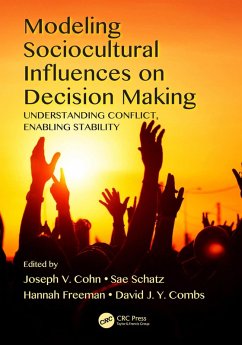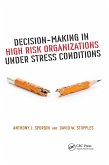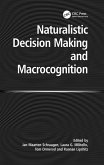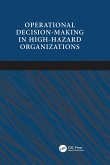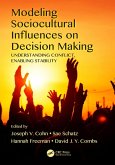Modeling Sociocultural Influences on Decision Making (eBook, PDF)
Understanding Conflict, Enabling Stability
Redaktion: Cohn, Joseph V.; Combs, David J. Y.; Freeman, Hannah; Schatz, Sae


Alle Infos zum eBook verschenken

Modeling Sociocultural Influences on Decision Making (eBook, PDF)
Understanding Conflict, Enabling Stability
Redaktion: Cohn, Joseph V.; Combs, David J. Y.; Freeman, Hannah; Schatz, Sae
- Format: PDF
- Merkliste
- Auf die Merkliste
- Bewerten Bewerten
- Teilen
- Produkt teilen
- Produkterinnerung
- Produkterinnerung

Hier können Sie sich einloggen

Bitte loggen Sie sich zunächst in Ihr Kundenkonto ein oder registrieren Sie sich bei bücher.de, um das eBook-Abo tolino select nutzen zu können.
Cross Cultural Decision Making seeks to understand the impact that a variety of influences including geographical, historical, sociological, organizational, team, and technology have on an individual's decision making processes. This book proposes to explore how advances in information and social media technologies, as well as modeling and simulation tools, can be leveraged to represent and characterize a culture's decision making processes, providing an alternative means for gaining a shared cultural understanding in today's hi-tech and globally interconnected world.
- Geräte: PC
- mit Kopierschutz
- eBook Hilfe
- Größe: 15.91MB
![Decision-Making in High Risk Organizations Under Stress Conditions (eBook, PDF) Decision-Making in High Risk Organizations Under Stress Conditions (eBook, PDF)]() Anthony J. SpurginDecision-Making in High Risk Organizations Under Stress Conditions (eBook, PDF)88,95 €
Anthony J. SpurginDecision-Making in High Risk Organizations Under Stress Conditions (eBook, PDF)88,95 €![Advances in Cross-Cultural Decision Making (eBook, PDF) Advances in Cross-Cultural Decision Making (eBook, PDF)]() Advances in Cross-Cultural Decision Making (eBook, PDF)74,95 €
Advances in Cross-Cultural Decision Making (eBook, PDF)74,95 €![Naturalistic Decision Making and Macrocognition (eBook, PDF) Naturalistic Decision Making and Macrocognition (eBook, PDF)]() Naturalistic Decision Making and Macrocognition (eBook, PDF)79,95 €
Naturalistic Decision Making and Macrocognition (eBook, PDF)79,95 €![Decision Making in Complex Environments (eBook, PDF) Decision Making in Complex Environments (eBook, PDF)]() Jan NoyesDecision Making in Complex Environments (eBook, PDF)60,95 €
Jan NoyesDecision Making in Complex Environments (eBook, PDF)60,95 €![Operational Decision-making in High-hazard Organizations (eBook, PDF) Operational Decision-making in High-hazard Organizations (eBook, PDF)]() Jan HayesOperational Decision-making in High-hazard Organizations (eBook, PDF)56,95 €
Jan HayesOperational Decision-making in High-hazard Organizations (eBook, PDF)56,95 €![Modeling Sociocultural Influences on Decision Making (eBook, ePUB) Modeling Sociocultural Influences on Decision Making (eBook, ePUB)]() Modeling Sociocultural Influences on Decision Making (eBook, ePUB)51,95 €
Modeling Sociocultural Influences on Decision Making (eBook, ePUB)51,95 €![Advances in Ergonomics Modeling and Usability Evaluation (eBook, PDF) Advances in Ergonomics Modeling and Usability Evaluation (eBook, PDF)]() Advances in Ergonomics Modeling and Usability Evaluation (eBook, PDF)74,95 €
Advances in Ergonomics Modeling and Usability Evaluation (eBook, PDF)74,95 €-
-
-
Dieser Download kann aus rechtlichen Gründen nur mit Rechnungsadresse in A, B, BG, CY, CZ, D, DK, EW, E, FIN, F, GR, HR, H, IRL, I, LT, L, LR, M, NL, PL, P, R, S, SLO, SK ausgeliefert werden.
- Produktdetails
- Verlag: Taylor & Francis eBooks
- Seitenzahl: 576
- Erscheinungstermin: 19. September 2016
- Englisch
- ISBN-13: 9781498736701
- Artikelnr.: 45973143
- Verlag: Taylor & Francis eBooks
- Seitenzahl: 576
- Erscheinungstermin: 19. September 2016
- Englisch
- ISBN-13: 9781498736701
- Artikelnr.: 45973143
- Herstellerkennzeichnung Die Herstellerinformationen sind derzeit nicht verfügbar.
Megacities and Other Dense Urban Areas; More than Just a Story: Narrative
Insights into Comprehension, Ideology, and Decision Making; The Spread of
Information via Social Media; The Spread of Opinions in Societies;
Culture's Influences on Cognitive Reflection; Cultural Influences on
Cognitive Biases in Judgment and Decision Making: On the Need for New
Theory and Models for Accidents and Safety; Section II Collecting and
Analyzing Data; The Sixty Percent Mission: An Introduction to High-Risk
Ethnography Process and Protocol in Support of the US Army's Civil Affairs
Humanitarian Mission; Challenges in Connecting with the Disconnected: An
Introduction to Connecting with Communities Disconnected from the Rest of
the World; They Are Beyond WEIRD: Helpful Frameworks for Conducting
Non-WEIRD Research; Deciphering the Emic Perspective in Data in Order to
Assess Threat; Collecting Data and Semantic Content via Mobile Devices;
Measuring Changes in Attitudes: Using Factor Analysis to Track Population
Attitudes Spatially and Temporally; Gaining Insight by Applying
Geographical Modeling; Section III Building and Validating Sociocultural
Models; Sociocultural Capability Requirements across All Phases of Military
Operations; Methods to Characterize and Manage Uncertainty for
Sociocultural Applications; Validating Causal and Predictive Claims in
Sociocultural Models; Rapid Generation of Political Conflict Simulations
for Scenarios around the World; Detailed Model Development Case Study: The
Peace Game; Section IV Applying Sociocultural Models to Gain Insight into
Conflict and Instability; Using the Social Framework Model of Trust to
Better Understand Trust in Government; Understanding Public Opinion toward
Violent Extremists; Modeling Sociocultural Influences on Decision Making:
Assessing Conf
Megacities and Other Dense Urban Areas; More than Just a Story: Narrative
Insights into Comprehension, Ideology, and Decision Making; The Spread of
Information via Social Media; The Spread of Opinions in Societies;
Culture's Influences on Cognitive Reflection; Cultural Influences on
Cognitive Biases in Judgment and Decision Making: On the Need for New
Theory and Models for Accidents and Safety; Section II Collecting and
Analyzing Data; The Sixty Percent Mission: An Introduction to High-Risk
Ethnography Process and Protocol in Support of the US Army's Civil Affairs
Humanitarian Mission; Challenges in Connecting with the Disconnected: An
Introduction to Connecting with Communities Disconnected from the Rest of
the World; They Are Beyond WEIRD: Helpful Frameworks for Conducting
Non-WEIRD Research; Deciphering the Emic Perspective in Data in Order to
Assess Threat; Collecting Data and Semantic Content via Mobile Devices;
Measuring Changes in Attitudes: Using Factor Analysis to Track Population
Attitudes Spatially and Temporally; Gaining Insight by Applying
Geographical Modeling; Section III Building and Validating Sociocultural
Models; Sociocultural Capability Requirements across All Phases of Military
Operations; Methods to Characterize and Manage Uncertainty for
Sociocultural Applications; Validating Causal and Predictive Claims in
Sociocultural Models; Rapid Generation of Political Conflict Simulations
for Scenarios around the World; Detailed Model Development Case Study: The
Peace Game; Section IV Applying Sociocultural Models to Gain Insight into
Conflict and Instability; Using the Social Framework Model of Trust to
Better Understand Trust in Government; Understanding Public Opinion toward
Violent Extremists; Modeling Sociocultural Influences on Decision Making:
Assessing Conf
